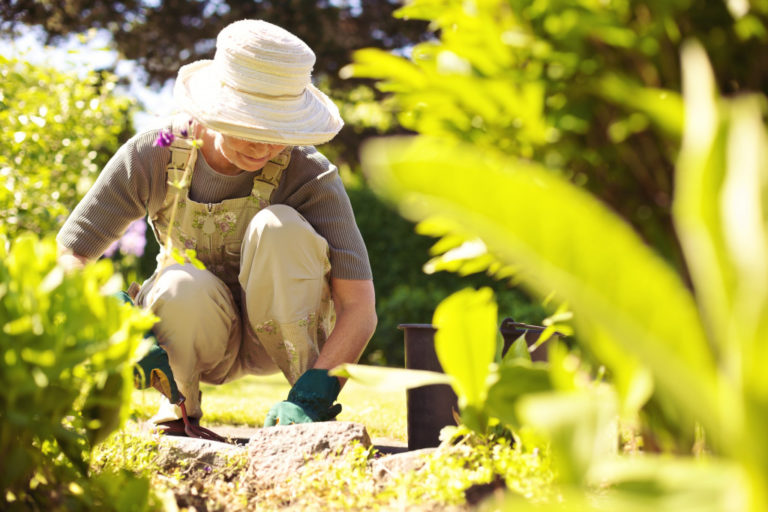Having a garden at home is a great way to get some exercise, fresh air, and sunshine. It’s also a great way to get some fresh fruits and vegetables. According to the Centers for Disease Control and Prevention, adults should get at least 2.5 hours of moderate-intensity aerobic weekly. Gardening can count as one of those activities.
Gardening can also help reduce stress levels. A study from the University of Essex in the United Kingdom found that people who gardened for 30 minutes felt less stressed and had lower cortisol levels, a hormone released in response to stress.
Gardening can also help improve mental health. A study from the Mental Health Foundation in the United Kingdom found that people who garden had higher overall well-being than those who didn’t. They also found that people who garden are more likely to be physically active, socialize more, and have a positive outlook on life.
While those are attractive benefits to make you want to start a garden, you might find gardening a lot of work. Unfortunately, your skills and knowledge might not be enough. This situation is where professional services come in, starting with these aspects.
Pest Control
Pest control is essential for any garden, but it can be a challenge for homeowners to do themselves. Pests can damage plants, spread disease, and even kill plants. There are many problems, each requiring a different approach to control.
Some common pests that can damage gardens include aphids, caterpillars, Colorado potato beetles, mosquitoes, slugs, and whiteflies. Aphids are small, soft-bodied insects that suck sap from plants. They can cause leaves to curl and distort and can also transmit diseases. Caterpillars are the larvae of butterflies and moths. They are very destructive, often eating the leaves and fruits of plants. Colorado potato beetles are a common pest in gardens. They feed on the leaves of potatoes and other vegetables. Mosquitoes can transmit diseases like malaria, yellow fever, and dengue fever. Slugs are slimy creatures that eat the leaves and stems of plants. Whiteflies are tiny white insects that suck sap from plants. They can weaken plants and cause them to die.
There are many ways to control pests in your garden. One way is to use physical barriers like nets or traps. You can also use chemical controls like pesticides or herbicides. However, you might want to utilize natural pest control items with them.
Another option is to use natural controls like predator insects or nematodes. It is essential to choose the method of pest control that is best suited for the pest you are trying to control.
However, doing it yourself can be difficult and time-consuming. It can also be dangerous if you don’t know what you are doing. You can hire a professional pest control service to avoid the hassle and risk.
Weeding
Weeds are unwanted plants that compete with desirable plants for space, water, and nutrients. They can also harbor pests and diseases that can damage your plants. Weeds can be difficult to control because they often have deep roots that make them hard to pull out. They can also spread rapidly, making them hard to keep up with for a healthier garden.
Some common weeds include dandelions, crabgrass, and thistles. Dandelions are yellow flowers that grow in clumps. They have long taproots that make them hard to pull out. Crabgrass is a grass that grows in thick mats, which can crowd out other plants and make it difficult for them to grow. Thistles are tall, spiny plants that spread quickly. They can make it difficult to walk through an area and can also damage clothes.
There are many ways to control weeds in your garden. One way is to hand-pull them. This is only effective for small areas and weed seeds that haven’t germinated. You can also use a mulch to smother weeds and prevent them from growing. Mulch is a layer of material placed over the soil that blocks sunlight and prevents weeds from growing.
However, weeding can be time-consuming. Moreover, you might not know the different types of weeds and how to control them. As a result, a professional gardener might be your best solution.
Tree Care
Trees are usually low-maintenance, but they still need some care. Storms, pests, and diseases can damage trees. They can also grow too large and become a danger to your property. Tree care also includes pruning, fertilizing, and pest control.

Pruning is the process of removing dead or diseased branches from a tree. It is important to prune trees because it allows them to focus their energy on new growth. It also prevents extensions from falling and damaging property. Fertilizing helps trees to grow strong and healthy. It provides them with the nutrients they need to thrive. Pest control protects trees from insects and diseases that can damage them.
Tree care can be difficult and dangerous if you don’t know what you are doing, making it necessary to get tree care service from an arborist. An arborist is a person who is trained in the care of trees. They can help you to identify problems with your trees and provide solutions.
Maintain a Healthy Garden Today
Knowing some gardening basics, you can start creating your healthy garden. Remember to choose the right plants for your climate and soil type. Water your plants regularly and fertilize them when needed. Control pests and weeds so they don’t damage your plants. And finally, get tree care service from an arborist to keep your trees healthy.
With some care, you can have a beautiful and healthy garden that will last for years.
